Sticky mucous membranes Study guides, Class notes & Summaries
Looking for the best study guides, study notes and summaries about Sticky mucous membranes? On this page you'll find 769 study documents about Sticky mucous membranes.
All 769 results
Sort by
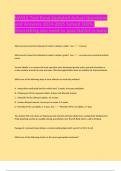 Popular
Popular
-
NAVLE Test Bank;Updated Actual Questions and Answers 2024-2025 Solved 100%;(Everything you need to pass NAVLE is here)
- Exam (elaborations) • 345 pages • 2024
-
- $22.99
- 2x sold
- + learn more
NAVLE Test Bank;Updated Actual Questions and Answers Solved 100%;(Everything you need to pass NAVLE is here) What nerve(s) need to be blocked in order to dehorn cattle? Ans- Cornual What nerve(s) need to be blocked in order to dehorn goats? Ans- cornual nerve and infratrochlear nerve Several rabbits in a commercial meat operation have developed genital scabs, perineal ulcerations a crusty exudate around the nose and eyes. Microhemaglutination tests are positive for treponematosis. ...
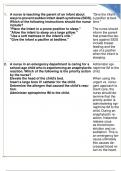 Popular
Popular
-
RN Nursing Care of Children Online Practice 2019 A with NGN 60 Q&A
- Exam (elaborations) • 39 pages • 2023 Popular
-
- $15.99
- 1x sold
- + learn more
1. A nurse is teaching the parent of an infant about "Give the infant ways to prevent sudden infant death syndrome (SIDS). a pacifier at bed- Which of the following instructions should the nurse include? "Place the infant in a prone position to sleep." "Allow the infant to sleep on a large pillow." "Use a soft mattress in the infant's crib." "Give the infant a pacifier at bedtime." 2. A nurse in an emergency department is caring for a school-age child who is experiencing an anap...
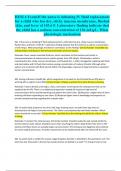
-
HESI 4 Exam/If the nurse is initiating IV fluid replacement for a child who has dry, sticky mucous membranes, flushed skin, and fever of 103.6 F. Laboratory finding indicate that the child has a sodium concentration of 156 mEq/L. What physiologic mech
- Exam (elaborations) • 23 pages • 2023
-
- $10.99
- + learn more
HESI 4 Exam/If the nurse is initiating IV fluid replacement for a child who has dry, sticky mucous membranes, flushed skin, and fever of 103.6 F. Laboratory finding indicate that the child has a sodium concentration of 156 mEq/L. What physiologic mechanism 301. If the nurse is initiating IV fluid replacement for a child who has dry, sticky mucous membranes, flushed skin, and fever of 103.6 F. Laboratory finding indicate that the child has a sodium concentration of 156 mEq/L. What ph...
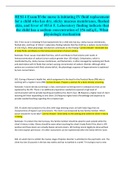
-
HESI 4 Exam/If the nurse is initiating IV fluid replacement for a child who has dry, sticky mucous membranes, flushed skin, and fever of 103.6 F. Laboratory finding indicate that the child has a sodium concentration of 156 mEq/L. What physiologic mech
- Exam (elaborations) • 23 pages • 2022
-
- $17.99
- + learn more
301. If the nurse is initiating IV fluid replacement for a child who has dry, sticky mucous membranes, flushed skin, and fever of 103.6 F. Laboratory finding indicate that the child has a sodium concentration of 156 mEq/L. What physiologic mechanism contributes to this finding? Correct Answer- Insensible loss of body fluids contributes to the hemoconcentration of serum solutes. Rationale: Fever causes insensible fluid loss, which contribute to fluid volume and results in hemoconcentrati...
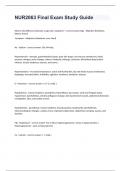
-
NUR2063 Final Exam Study Guide 2023/2024 passed
- Exam (elaborations) • 22 pages • 2024
- Available in package deal
-
- $19.99
- + learn more
NUR2063 Final Exam Study GuideWhat is the difference between a sign and a symptom? - correct answer Sign - Objective (Erythema, Edema, lesion) Symptom - Subjective (Headache, sore, tired) Na - Sodium - correct answer 136-144 mEq Hyponatremia - anorexia, gastrointestinal upset, poor skin turgor, dry mucous membranes, blood pressure changes, pulse changes, edema, headache, lethargy, confusion, diminished deep tendon reflexes, muscle weakness, seizures, and coma | Hypernatremia - increa...
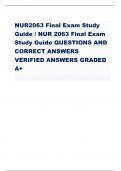
-
NUR2063 Final Exam Study Guide / NUR 2063 Final Exam Study Guide QUESTIONS AND CORRECT ANSWERS VERIFIED ANSWERS GRADED A+
- Exam (elaborations) • 41 pages • 2024
- Available in package deal
-
- $14.99
- + learn more
NUR2063 Final Exam Study Guide / NUR 2063 Final Exam Study Guide QUESTIONS AND CORRECT ANSWERS VERIFIED ANSWERS GRADED A+ What is the difference between a sign and a symptom? - CORRECT ANSWER-Sign - Objective (Erythema, Edema, lesion) Symptom - Subjective (Headache, sore, tired) Na - Sodium - CORRECT ANSWER-136-144 mEq Hyponatremia - anorexia, gastrointestinal upset, poor skin turgor, dry mucous membranes, blood pressure changes, pulse changes, edema, headache, lethargy, confusion, ...
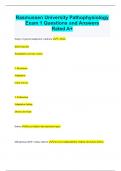
-
Rasmussen University Pathophysiology Exam 1 Questions and Answers Rated A+
- Exam (elaborations) • 47 pages • 2024
- Available in package deal
-
- $11.99
- + learn more
Rasmussen University Pathophysiology Exam 1 Questions and Answers Rated A+ Stages of general adaptation syndrome 1. Alarm Initial reaction Sympathetic nervous system 2. Resistance Adaptation Limit stressor 3. Exhaustion Adaptation failing Disease develops Edema Excess fluid in the interstitial space Dehydration (ECF volume deficit) Can occur independently without electrolyte defects Decrease in fluid level leads to increase in level of blood solutes Cell shrinkage ...
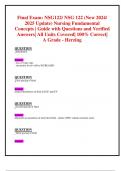
-
Final Exam: NSG122/ NSG 122 (New 2024/ 2025 Update) Nursing Fundamental Concepts | Guide with Questions and Verified Answers| All Units Covered| 100% Correct| A Grade - Herzing
- Exam (elaborations) • 45 pages • 2024
- Available in package deal
-
- $10.99
- + learn more
Final Exam: NSG122/ NSG 122 (New 2024/ 2025 Update) Nursing Fundamental Concepts | Guide with Questions and Verified Answers| All Units Covered| 100% Correct| A Grade - Herzing QUESTION dehydration - loss of water only - electrolyte levels will be INCREASED QUESTION First spacing of fluid Answer: normal distribution of fluid in ECF and ICF QUESTION Second spacing of fluid Answer: abnormal accumulation of interstitial fluid - edema (CHF, sodium ret...
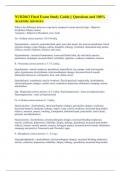
-
NUR2063 Final Exam Study Guide || Questions and 100% Accurate Answers.
- Exam (elaborations) • 15 pages • 2024
-
- $11.79
- + learn more
What is the difference between a sign and a symptom? correct answers Sign - Objective (Erythema, Edema, lesion) Symptom - Subjective (Headache, sore, tired) Na - Sodium correct answers 136-144 mEq Hyponatremia - anorexia, gastrointestinal upset, poor skin turgor, dry mucous membranes, blood pressure changes, pulse changes, edema, headache, lethargy, confusion, diminished deep tendon reflexes, muscle weakness, seizures, and coma | Hypernatremia - increased temperature, warm and flushe...
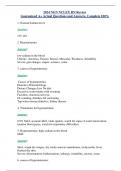
-
2024 NGN NCLEX RN Review Guaranteed A+ Actual Questions and Answers, Complete 100%
- Exam (elaborations) • 26 pages • 2024
-
- $13.99
- + learn more
2024 NGN NCLEX RN Review Guaranteed A+ Actual Questions and Answers, Complete 100% 1. Normal Sodium level: Answer: 135-145 2. Hyponatremia: Answer: low sodium in the blood Chronic: Anorexia, Nausea, Emesis, Muscular, Weakness, Irritability Severe: gait changes, stupor, seizures, coma 3. causes of hyponatremia: Answer: Causes of hyponatremia: Diuretics-Thiazide Drugs Dietary Changes,Low Na diet, Excessive water intake with sweating Fad diets, Anorexia nervosa. GI vomiting, diar...
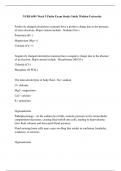
-
NURS 6501 Week 5 Patho Exam Study Guide Walden University
- Exam (elaborations) • 20 pages • 2024
-
- $10.00
- + learn more
Positively charged electrolytes (cations) have a positive charge due to the presence of extra electrons. Major cations include - Sodium (Na+) Potassium (K+) Magnesium (Mg++) Calcium (Ca++) Negatively charged electrolytes (anions) have a negative charge due to the absence of an electron. Major anions include - Bicarbonate (HCO3-) Chloride (Cl-) Phosphate (H PO4-) The main electrolytes in body fluid - Na+ sodium Cl- chlorine Mg2+ magnesium Ca2+ calcium K+ potassium Hyponatremia Path...

How did he do that? By selling his study resources on Stuvia. Try it yourself! Discover all about earning on Stuvia


